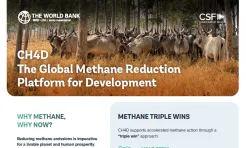Methane is responsible for a third of global warming and produces 80-times more atmospheric warming than carbon dioxide over the first twenty years.. Yet, methane remains in the atmosphere only a decade in comparison to centuries of carbon dioxide. Despite being the fastest and most cost-effective way of reducing the rapid increase in temperature, methane reduction is often underprioritized, receiving less than 2 percent of global climate finance.
The World Bank’s Global Methane Reduction Platform for Development (CH4D) housed within the CSF, was launched at COP28 as the World Bank's hub for accelerating methane action in the high-emitter sectors of agri-food, waste and sanitation. CH4D is part of a larger institutional commitment towards global methane reduction, announced at COP28, and is complimented by the Global Flaring and Methane Reduction Partnership (GFMR), which focuses on reducing methane from the energy sector.


 Near-term GHG abatement
Near-term GHG abatement Enhance environmental resilience
Enhance environmental resilience Empower livelihoods and health
Empower livelihoods and health